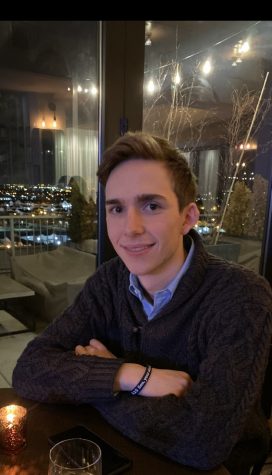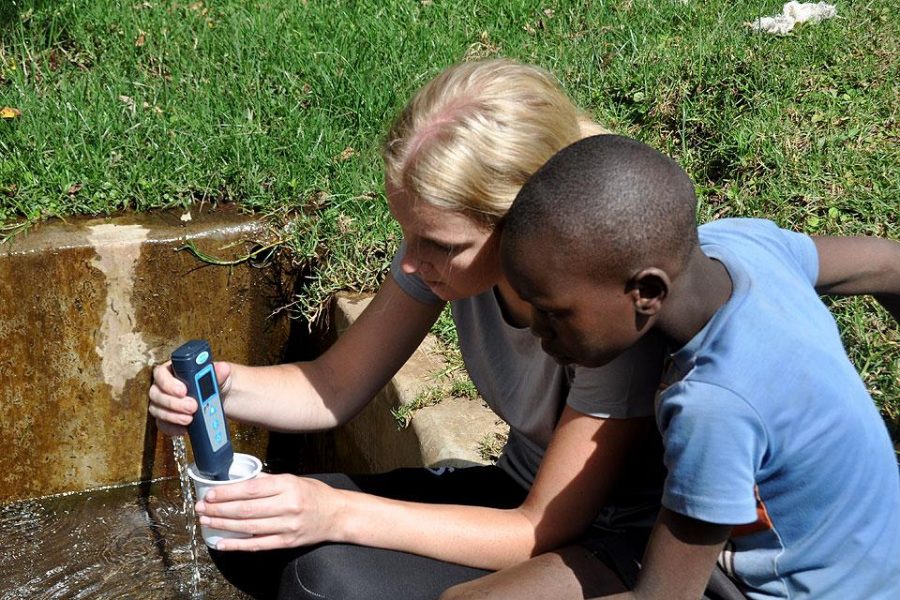SLU Students do “Tangible Good” in Kenya
SLU’s chapter of Engineering Without Borders, a nationwide organization dedicated to “building a better world through engineering projects that empower communities to meet their basic human needs,” has been hard at work in partnership with an orphanage in Kapenguria, Kenya, to design and implement a solar-powered water system that provides year round, stable access to sanitary water.
Kapenguria, a municipality with an urban population of 13,000 and a total population of 56,000, is located near Kenya’s Western border with Uganda. The region is filled with communities that lack the technology to provide consistent access to clean water. EWB-SLU executive members, President Lauren Beduhn and Marketing Director Maggi Richard, emphasized the importance of reliability in regards to clean water. The problem is not that Kapenguria has no access to clean water, or even that their technology is especially primitive. Rather, the pump system is electric, and cannot be relied on to consistently pump clean water for the community. Inconsistent access to sanitary water can have devastating effects on a community, Beduhn pointing to “waterborne diseases, difficulty in maintaining general sanitation and severe dehydration” as some of the ill effects of unreliable water access.
Last summer, EWB-SLU members Emma Nehring, Lauren Beduhn and Carla Rattunde traveled to Kapenguria under the direction of SLU faculty members Ronaldo Luna, Ph.D. and Craig Adams, Ph.D. to begin the first stage of the project on the ground.
Like most of the projects EWB-USA undertakes, the Kapenguria water project does not come without difficulties. Beduhn noted a number of logistic obstacles, first and foremost, communication. “The time difference is a huge factor that can make communication difficult.”
Moreover, financial considerations factor into the success of the project. EBW-SLU has done a remarkable job in raising funds to ensure the project’s success. Students have partnered with local businesses and have promoted campus-wide charity efforts. WIthout these student-driven efforts, the project simply would not have gotten off the ground.
Beduhn and Richard were quick to stress that EWB-SLU is by no means playing the role of a “savior” and swooping in to Kapenguria to unilaterally fix its water access problems. EWB-USA believes first and foremost in sustainability and cross-cultural collaboration. “We are not swooping in saving those at the orphanage,” said Richard. But “facilitating and assisting a self sustaining water system in tandem with the Kapenguria community.”
They went on to accentuate the importance of the partnership between the community and EWB-SLU. Richard said, “It is not our project. We are collaborating with the orphanage and the surrounding community in solving the problem together.” To that end, the 2018 assessment was centered around gathering relevant information about the state of the current water system from the community members who know it most intimately. The initial assessment process, which took place in conjunction with the local experts, was aimed at procuring data about water quality, local geography and other factors that will influence the implementation of a solar-powered water system. Most importantly, EWB-SLU made sure to reach out to the local community and listened to personal testaments about their specific water needs.
The spirit of collaboration and ultimate aim of self-sufficiency does not end with the assessment stage. EWB-SLU is committed to an operation and maintenance plan that ensures that long after the project’s five-year timetable, the local community will be the sole maintainers of the water system. Local adults will be integral in the construction phase of the project, and will be trained to repair the system if the need ever arises. All materials will be purchased from the local community, including replacement parts, meaning that the impact of the project extends to stimulating Kapenguria’s economy, in addition to providing stable access to clean water.
For Beduhn, a junior studying Civil Engineering, and Richard, a sophomore studying Mechanical Engineering, the project has enhanced their classroom experience immeasurably. Both students illustrated the fulfillment they get in putting classroom skills into practice in the real world. “It’s incredibly gratifying to use the knowledge I have gained at SLU to produce tangible good in the world,” Beduhn said, echoing the sentiments of many of her EWB-SLU peers.
Ultimately, the engineering skills picked up in the classroom and the practical experience gained on the assessment trip and future water project endeavors compliment each other remarkably. Richard described the project as an “opportunity to learn things which are not easily learned in the classroom. We learned how to collaborate with other engineers, and how to deal with real world logistical details that we aren’t necessarily exposed to in the classroom.” On the other hand, SLU courses in hydraulics, to name just one, has laid the intellectual groundwork for the water project to matriculate.
EWB-SLU is currently planning a trip for this upcoming summer to begin installation of the solar-powered piping system. For more information about upcoming opportunities to contribute to the Kapenguria water project, visit EWB-SLU’s donation link at https://support.ewb-usa.org/campaign/saint-louis-university-chapter/c84201. Follow EWB-SLU on Facebook at “EWB.slu” and Instagram at “ewb_slu” for updates on the project.
Your donation will support the student journalists of Saint Louis University.





